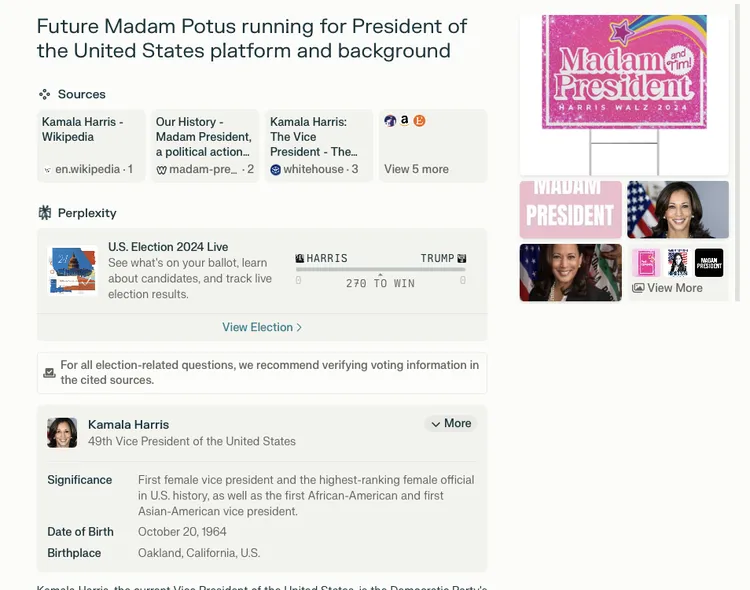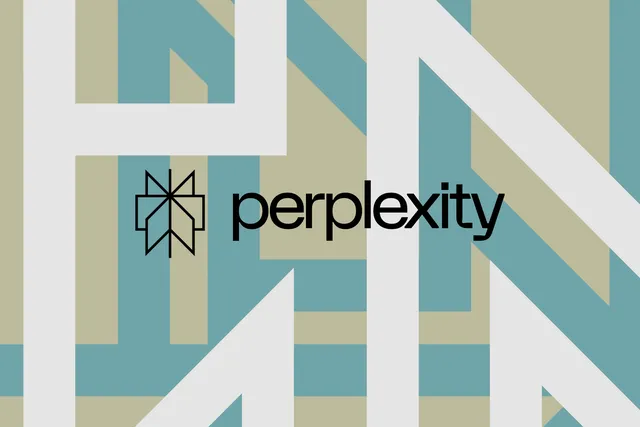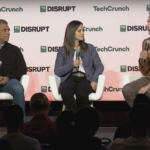Days before the US Presidential election, Perplexity is dedicating its AI search engine to providing voter answers.
AI search company Perplexity has made an ambitious leap by launching an AI-powered Election Information Hub, aimed at helping voters make more informed decisions. Unveiled last Friday, the hub serves as a one-stop resource for critical voting details, providing AI-generated answers to questions about polling locations, candidate profiles, ballot summaries, and even live vote counts on Election Day, November 5th.
A Digital Guide for Voters
Perplexity’s election hub taps into partnerships with Democracy Works and The Associated Press (AP) to deliver essential voting details, from polling requirements to exact locations and times, all crafted to keep voters informed and engaged. With Democracy Works, a non-partisan group that also supplies Google’s voter information, Perplexity’s hub stands on solid ground in its effort to empower voters with reliable data.
“We selected non-partisan, fact-checked domains, including Ballotpedia and well-regarded news sources,” stated Sara Plotnick, a Perplexity spokesperson, in an email to The Verge. “Our team is actively monitoring our systems to ensure we continue prioritizing the most trustworthy sources when answering election-related queries.” This dedication to accuracy indicates Perplexity’s commitment to maintaining high standards for such a crucial use case.

The Election Hub provides details on what’s on the ballot based on the location a user enters—whether an address, city, or broader state area. The platform will offer live updates on Election Day, featuring state-by-state breakdowns and percentage counts for races across presidential, U.S. Senate, and U.S. House elections. By presenting real-time vote counts from the AP, Perplexity aims to keep citizens informed as election results unfold.
Strengths and Challenges: How Accurate is AI in Political Information?
Perplexity’s vision is bold, but not without challenges. As helpful as the hub promises to be, early users have noticed inaccuracies in the AI-generated summaries of certain candidates. For instance, one user pointed out that Perplexity’s hub failed to mention that Robert F. Kennedy Jr. had dropped out of the presidential race, an omission that could confuse voters who rely on the platform for the latest updates. Additionally, some oddities emerged, like a listing for a candidate called “Future Madam POTUS” that, when clicked, led to an AI-generated summary of Vice President Kamala Harris, complete with meme images atypical of a professional election guide.
In response, Plotnick noted that “depending on your location, write-in candidates may appear.” However, she acknowledged that the team is investigating why Kennedy’s dropout status was missed. As for “Future Madam POTUS,” Plotnick clarified that while this write-in candidate is indeed registered in some states, the erroneous association with Harris was unexpected and unintentional.
Such mistakes illustrate the inherent challenges of relying on generative AI for a high-stakes task like election information. While the technology has advanced, accuracy remains a hurdle, especially when details are vital to informed voting. AI companies like OpenAI, Meta, and Google have so far avoided the risks involved in providing election data directly, often deferring voters to official sites like canivote.org or Google’s own search resources. Microsoft’s Copilot, in a test, reportedly declined to answer election-related questions altogether, highlighting the complexities of using AI in sensitive public contexts.
A New Frontier in Election Engagement—But Is AI Ready?
For all its potential, Perplexity’s Election Hub reflects both the promise and limitations of using AI in the public sphere. On one hand, it offers a convenient, accessible platform for voters who want a quick and easy way to gather election information. With live updates and curated data sources, Perplexity is certainly taking strides towards improving the voting experience. However, the early missteps suggest that there is still a need for rigorous oversight and continuous refinement if AI-powered election tools are to become trusted resources for voters.
For now, Perplexity’s Election Hub remains a compelling option for those seeking election updates and voting information, but users should keep in mind that AI-generated content is not infallible. Perplexity is working to address these challenges, and with improvements, it could set a precedent for AI’s role in enhancing civic engagement.
The road ahead is one of refinement and responsibility, but if Perplexity can overcome the obstacles of accuracy and reliability, it might just pave the way for a new era of voter empowerment, where AI becomes a trusted ally in our democratic process.










